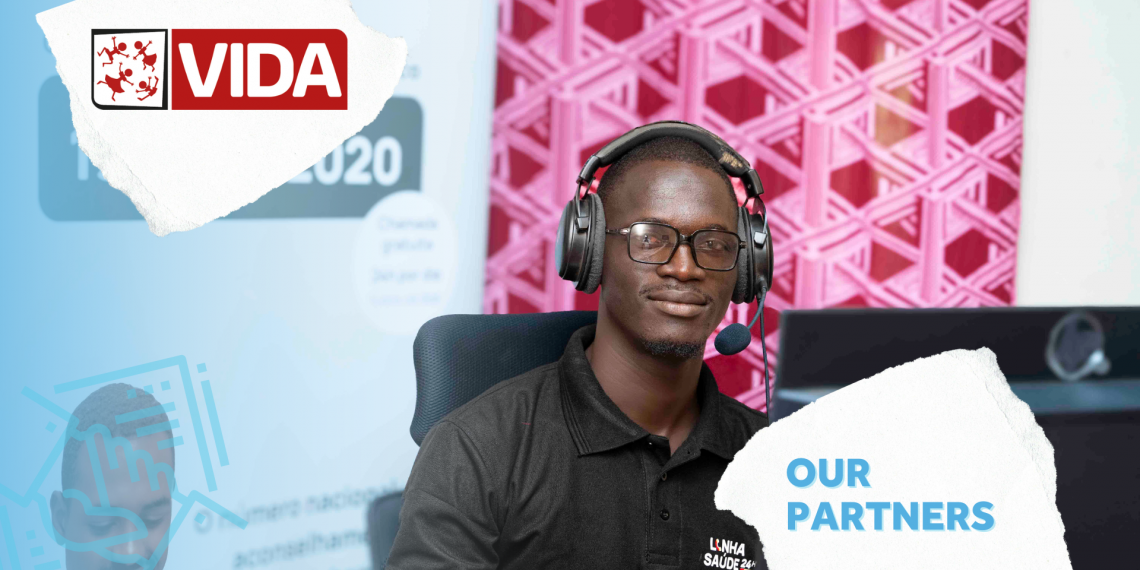VIDA – International Volunteers for African Development – is a Portuguese non-governmental organisation that helps people to develop their capacities and the potential of the land where they live, with a view to sustainable and just human development.
We had a chat with the VIDA team about the collaboration with INESC TEC.

Recently, INESC TEC collaborated with VIDA within the scope of the “Linha de Saúde 24h” project. What are the main objectives of the project?
The main goal is to provide the population of Guinea-Bissau with a 24/7 contact centre available to the whole territory, carrying out the screening, counselling and referral of non-urgent and urgent health-related situations. This free service contributes to ensuring more equitable access to healthcare, especially in hard-to-reach and isolated geographical areas – some of them are only accessible by boat, while others get completely inaccessible during the wet season. As an example, the distance between a village and the nearest healthcare facility can vary between 3km to 25km, often by foot. However, most people already have access to a device and mobile network – which makes it simple to contact and receive the necessary support from a healthcare provider.
The 24-hour health line follows previous work experience with the COVID-19 call centre, coordinated by VIDA between 2020 and 2022 – which proved to be particularly important due to its outreach, ensuring access to specialised healthcare services during the pandemic. This experience provided us a clear idea of the path we should follow to facilitate the population’s access to healthcare services, acting in a complementary way to the national healthcare service.
What are the main results thus far?
Despite the initial date of the project being November 1, 2023, the phone line became operational on July 8, 2024, after the process of creating and installing the software to support it – designed in partnership with INESC TEC – and recruiting and training the entire technical and support teams.
In the first four months, the contact centre received 3,120 calls from all regions of the country, 73% of which were related to health issues, 7% were complaints of illegal acts in state services and 3% related to civil protection events (accidents, violence, fires, etc.). 74% of the calls received were made by users between 15 and 34 years of age, which corresponds to the largest fringe of the population in Guinea-Bissau. Given the context and the “novelty factor”, it’s safe to say that the assessment of the first months is positive, with a considerable number of calls. We believe that the number of calls will increase, as people gain more confidence in this service or benefit from a positive experience – especially if the operator helped them in terms of counselling or referral. In addition to the communication plan, we believe that “word of mouth” will increase people’s knowledge of this service and increase our credibility.
How do you rate your experience with INESC TEC?
The partnership with INESC TEC was vital to develop a high-quality computer system to support the phone services, considering the country’s context, the technical challenges and the needs identified.
The two members of the INESC TEC team who joined us – João Marco Silva and Pedro Moreira – were tireless; they travelled to Guinea-Bissau to support the team, carry out the installation of the computer system and provide adequate training. Throughout the process, the INESC TEC team was fully committed and available for this “mission”. It was a very fruitful and collaborative learning experience, both for the team at the headquarters in Portugal and for the project team in Bissau.
The partnership between VIDA and INESC TEC focused on the technological modernisation of healthcare services, always adapted to the context and considering the constraints and particularities of the territory – a factor that is also crucial for the success of the operation of the “Linha de Saúde 24h”.
How can this collaboration contribute to advances in basic services in Guinea-Bissau?
This service allows an immediate and personalised response in healthcare, in a country with different geography regions, often hard to reach or isolated. Moreover, it is a concrete and viable solution that will help address some of the gaps of the healthcare system in Guinea-Bissau, e.g., universal health coverage, the lack of a healthcare referral system, and the difficulty in integrated emergency response. This service requires a greater liaison between different entities and ministries related to healthcare and civil protection to provide more and better responses to the citizens.
Finally, the fact that the computer system developed specifically for this project is easy to use by the team and allows not only the tasks of screening, counselling and referral, but also the production of reports on the different services provided to the population, helps to collect up-to-date and reliable data that will support the respective ministries and state entities, as well as international partners, in their decision-making and policy making.
What can we expect from VIDA over the upcoming years?
As a non-governmental development organisation (NGDO), VIDA will remain committed to its ongoing presence in Guinea-Bissau and Mozambique, the two countries where we have been working for more than 30 years. It’s vital to ensure the collaboration with different actors and national and international partners in the different areas of intervention: healthcare and population; natural resources, food and climate; income and resilience; education towards development and citizenship and capacity-building of HR, to boost the economy and support society. We already perceived integrated development as a key aspect to our work; but by analysing the current situation, we believe that this is the only way to carry out our mission.
We expect and hope for future collaboration endeavours with INESC TEC, to combine science and technology with fairer and more supportive development activities, towards improving people’s lives.



 News, current topics, curiosities and so much more about INESC TEC and its community!
News, current topics, curiosities and so much more about INESC TEC and its community!